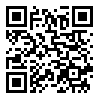1- Ph.D. student of psychology, University of Mohaghegh Ardabili, Ardabil, Iran , m.mousavi@uma.ac.ir
2- Professor, Department of Psychology, Gilan University, Gilan, Iran
3- Professor, Department of Psychology, University of Mohaghegh Ardabili, Ardabil, Iran
2- Professor, Department of Psychology, Gilan University, Gilan, Iran
3- Professor, Department of Psychology, University of Mohaghegh Ardabili, Ardabil, Iran
Abstract: (1316 Views)
Interpersonal skills are proposed as an important framework for understanding and developing mental and social health. Patients with depression have serious disorders in interpersonal skills. The purpose of this study was to investigate the role of a sense of coherence, brain-behavioral systems, and attributional styles in predicting the interpersonal skills of people with major depression. The current research is fundamental in nature and descriptive correlation regarding purpose. In this research, 100 major depressed patients admitted to Razi Psychiatric Hospital in Tabriz city were selected using the available sampling method. Then, using measurement tools including Beck depression inventory (BDI), interpersonal skills questionnaire (ISQ), sense of coherence (SOC), brain behavioral systems (BBS), and attributional styles questionnaire (ASQ), the role of sense of coherence, brain-behavioral systems and attributional styles in predicting interpersonal skills of these patients were investigated. Data analysis used Pearson's correlation coefficient and multiple regression analysis using SPSS23 software. The results showed that attribution styles explain 13.8% of the variance of interpersonal skills of depressed patients. These results state that attributional styles predict the interpersonal skills of depressed patients. According to the results of this research, it is suggested that experts include attributional styles in the care plan of depressed patients.
Article number: 6
Keywords: Depression, Sense of Coherence, Brain-Behavioral Systems, Attributional Styles, Interpersonal Skills
Type of Study: Research |
Subject:
Special
Received: 2024/03/4 | Revised: 2025/07/18 | Accepted: 2025/07/24 | ePublished ahead of print: 2025/10/5 | Published: 2026/01/16
Received: 2024/03/4 | Revised: 2025/07/18 | Accepted: 2025/07/24 | ePublished ahead of print: 2025/10/5 | Published: 2026/01/16
Send email to the article author
| Rights and permissions | |
 |
This work is licensed under a Creative Commons Attribution-NonCommercial 4.0 International License. |



